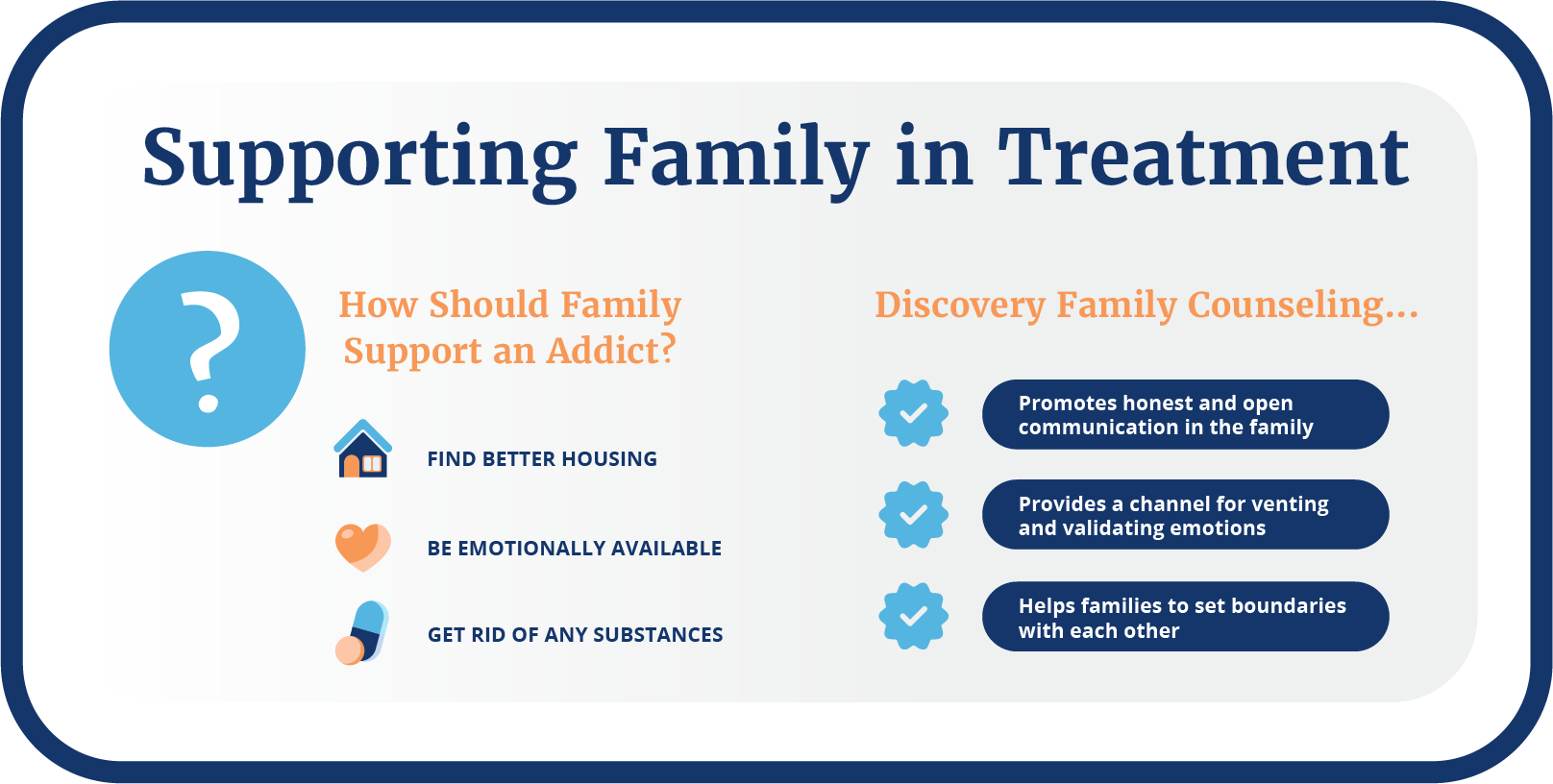Family Support
At Discovery Institute we know the importance of family counseling and that the entire family needs to be treated and supported individually and as a group.

Elizabeth Davies, BA, CADC
Primary Counselor

Jennifer Barr Whaley, MA, LCADC, SA
Primary Counselor
Learn to…
- Support your loved ones while they are still using without enabling their addictions
- Find ways to help your loved one enter a treatment facility
- Manage your stress and expectations
- Understand the Disease Concept of Addiction
- Interventions
- Guidelines for Family and Friends
- Enabling Behaviors
- Treatment Process including Detox, Residential, and IOP
- Focus on Health Relationships and Families
- Al-Anon/Nar-Anon
- Recovery Fellowships
The first step in getting help for addiction is finding the right treatment program. But once you have made that first step, you might be curious as to what those programs will entail. The best programs will always offer family counseling as part of your recovery. Addiction affects the entire family and everyone who loves the struggling individual. Because of this, we know the importance of family counseling and that the entire family needs counseling and support, both individually and as a group.
How Addiction Affects the Entire Family

Unfortunately, addiction has a ripple effect. It causes changes and difficulties to arise in the lives of those who are struggling in addition to their loved ones. Substance dependence can create problems in people’s homes, jobs, and interpersonal relationships. It can cause rifts between spouses, children and parents, siblings, and more.
The family may begin to depend on one spouse’s income instead of both as a result of the addicted person’s inability to keep working. It can also be difficult for spouses of struggling individuals to single-handedly meet the needs of their children. They may struggle as they try to keep a sense of normalcy in the home despite their spouse’s substance use disorder.
The children of those who are suffering from addiction often feel the negative effects of this struggle. Younger children may feel deserted or forgotten. Sadly, some suffer emotional, mental, and physical abuse at the hands of intoxicated parents. Many children who grow up in homes where there is substance misuse develop addictions later in life.
The adult children of parents who suffer from addiction may also experience some serious effects. Unfortunately, many older adults suffer from prescription misuse or dependence. Some aging individuals misuse alcohol and develop alcohol use disorders. Their children may blame themselves or feel helpless in the face of their parent’s struggles.
Sometimes, there may be a role reversal in the homes where addiction is present. Children may take on a caretaker role, looking after their struggling parents and their younger siblings. They might begin to tend to the duties and responsibilities in the home. Children of suffering individuals might even begin to make excuses for their parents’ behaviors and actions.
Sadly, many people helplessly watch as their children battle with addiction. Whether their children suffer from alcoholism, illicit drug dependence, or prescription drug misuse, parents often struggle with feelings of guilt. They may feel as though they are to blame for their child’s addiction. Some parents of struggling individuals feel stuck between showing love toward their children and helping these individuals to end substance dependence.
Finally, the siblings of suffering individuals may encounter many difficulties. Just as the parents, spouses, and children of substance users, the siblings of these individuals may take on new roles. They may become financial supporters for the individuals and/or their families. Siblings may also struggle with guilt and shame as a result of their loved ones’ addictions.
Why Should People Consider Family Counseling?
Family therapy offers plenty of benefits to the family units that have been affected by addiction. This type of counseling can work to meet the emotional, physical, and mental needs of these families.
It’s easy to assume that individuals who suffer from addiction are the only ones who feel the effects of their battle. However, this simply isn’t true. Their family members may also experience quite a bit of pain and loss throughout the individual’s struggle. The trust may be broken. Familial connections may be lost. Families may begin to drift apart as stress, guilt, blame, fear, and concerns come between them.
Even once the individual decides to seek help for his or her addiction, the family is still left to pick up the pieces. The trust that was broken does not automatically rebuild itself. The feelings of loss and helplessness will not leave right away. Pain and resentment may remain.
Just as it is important for people in recovery to receive professional guidance and support, their families should also seek help. Through therapy, the spouses, children, parents, and siblings of people in recovery can also find healing.

CONTACT US
Find out how we can help
Our compassionate counselors are standing by to answer any questions you may have. After helping thousands of people over the last 50 years, we have the resources to help you and your family and all your individual needs.
What Are the Advantages of Family Therapy?
Thankfully, the family members of those who suffer from addiction can find peace and support. Family counseling works to offer helpful resources to families that are dealing with the effects of addiction.
Often, people who know an individual who is suffering from addiction will show enabling characteristics. In most cases, this is unintentional; people don’t usually mean to enable the addiction of a loved one. However, these behaviors, as harmless as they may seem, can be very harmful to the struggling individual. Some examples of enabling behaviors may include:
- Giving money to the struggling individual
- Taking on the person’s financial burdens
- Buying or providing drugs or alcohol for the individual
- Ignoring or justifying the individual’s actions
- Failing to address or express your concerns
- Offering the individual a place to live (especially if they were once self-sufficient)
- Lying to friends, family members, or even employers in order to “cover” for the individual
This benefit is much like the previous one. As individuals begin to learn more about enabling behaviors, they can also start to establish healthy boundaries. Family counseling can help people to learn more about themselves. Individuals can gain a deeper understanding of their weaknesses, strengths, what overwhelms them, and what they may need throughout the healing process.
As people develop an understanding of their own boundaries, they can become more comfortable with the recovery process. It’s important for family members to take their time during this period. They should never feel as though they need to ignore or suppress their emotions. Family therapy works to help people do exactly the opposite of that.
While learning to recognize and address their feelings, families can establish their own boundaries and discuss the ways in which they can work together to facilitate healing in their lives and in the life of their recovering loved ones.
Empathy is an important component throughout the recovery process. Often, people think of addiction as a matter of choice. They think struggling individuals are simply choosing substance use over priorities such as family. But, this is far from the truth.
Those who suffer from addiction suffer from chemical dependency. Addiction is a disorder that prevents people from being able to go without substance use. So, individuals who suffer from substance dependence cannot stop using alcohol or drugs, regardless of how hard they try. This is why professional treatment is so important.
This is also why family therapy is so important. In counseling, families can learn more about the truth behind addiction. They can develop a much deeper comprehension of how addiction has impacted their loved ones. This will help families to have a better sense of understanding as they work to support their recovering family members.
Counseling for families encourages honesty, trust, and conflict resolution. All of these are important for the health of a family unit. But, each of these things can disappear when addiction is in the mix. That’s why it’s best for families to attend therapy. They can develop healthy communication skills and feel more comfortable about addressing concerns.
It is important to note that communication between non-addicted family members can also be broken as a result of one individual’s struggle with substance dependence. For example, spouses may become distant as a result of a child’s addiction. Siblings may disagree about how to address their brother’s alcoholism or their sister’s drug dependence. This can cause a rift to develop.
Thankfully, family counseling works to help mend relationships between family members. Family members can begin to make amends with one another. This will also enable families to extend that understanding and forgiveness toward the individual who is recovering from addiction.
Forgiveness is never easy, especially in situations that involve addiction. Many times, people who struggle with substance dependence do things that could bring emotional or physical pain to their loved ones. Unfortunately, abuse can occur when addiction is involved. Also, things like dishonesty and stealing might occur.
It can be difficult for people to forgive their loved ones for the hurt they may have caused. But, family therapy offers families an environment that facilitates forgiveness. Through counseling and therapy, individuals can make amends and work to rebuild trust in the recovering individual.
As we mentioned earlier, family counseling strives to help families feel free to address their emotions. While in therapy, individuals can freely express their pain and struggles. They can discuss their concerns and relieve themselves of the stress, tension, and fears they have been experiencing.
Seeing a loved one suffer from addiction can cause people to develop very deep-rooted emotional discomfort. But, family therapy works to help uncover those issues. It helps families to work through these emotions and concerns in a healthy and effective way.
Family Support and Counseling for Drug and Alcohol Addiction
 At Discovery Institute, we include the family in counseling and therapy from the moment a client enters our facility. Approved family members and loved ones will be encouraged to be a part of the treatment process and to stay involved. Here are some of the ways in which we include family members in the recovery process:
At Discovery Institute, we include the family in counseling and therapy from the moment a client enters our facility. Approved family members and loved ones will be encouraged to be a part of the treatment process and to stay involved. Here are some of the ways in which we include family members in the recovery process:
Individual family counseling – In family counseling, we will address the family members individually without the suffering individual present. This enables family members to privately discuss any concerns they may have. Addiction can be devastating for the suffering individual’s loved ones. So it is crucial for them to get the answers and help they need, too.
Group family counseling – We also address family members and the struggling individual together, so that issues can get resolved under the guidance of a professional therapist. This is a way for individuals and their loved ones to begin to resolve issues and move forward in recovery, together.
Support and resources – while a person is in rehab, concerned family members must take steps to heal themselves. For a person to stay sober, they need a strong support system in place. We will give you the support you need as well as resources to figure out what else is out there.
While sobriety must begin with the individual who is suffering from addiction, family members can go a long way in helping them reach their goals. Being a part of the recovery process may be the best thing you can do for yourself, your family, and the recovering individual. To discuss your treatment options, contact us today. Allow our team to help you and your family find the healing and freedom you deserve!
Dr. Joseph Ranieri D.O. earned his BS in Pharmacy at Temple University School of Pharmacy in 1981 and His Doctorate Degree in Osteopathic Medicine at the Philadelphia College of Osteopathic Medicine in 1991. He is Board Certified by the American Board of Family Medicine and a Diplomate of the American Board of Preventive Medicine Addiction Certification. Dr. Ranieri has lectured extensively to physicians, nurses, counselors and laypeople about the Disease of Addiction throughout New Jersey and Pennsylvania since 2012.



